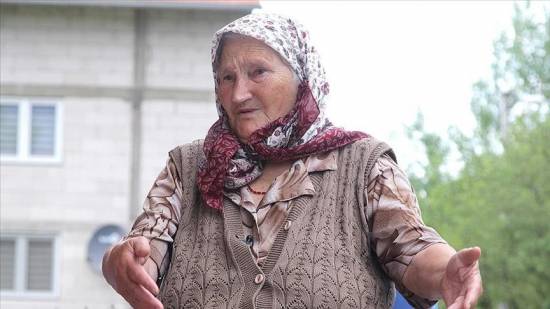Mother in Srebrenica mourns for her family members lost through genocide Featured
Mevlida Hukic dearly misses her husband, three of her sons and two brothers who were among the thousands of victims of the 1995 genocide in Srebrenica in eastern Bosnia and Herzegovina.
"I always dreamed of them after they were killed. I still ‘see’ them and cry. I'm still struggling. It wasn’t easy to raise children and guide them to the right path. Now they’re gone. I don't know how long God will give me to live,'' she said.
The 74-year-old Hukic will finally bid farewell after 27 years to her son Sejad and husband Hajdin on the 27th anniversary of the genocide.
Every year on July 11, newly identified victims of the genocide are buried at a memorial cemetery in the village of Potocari, located six kilometers (3.7 miles) northwest of Srebrenica.
Hukic had buried one of her sons earlier at the Potocari Memorial Center. But the remains of her youngest son, Samir, have never been found.
She said she raised her children with strong moral values.
"People admired them. After they were killed, I always saw them in my dreams,'' said Hukic.
Hukic said she seeks justice for those who are responsible.
"I don't hate anyone, but as a Muslim, I ask Allah to give those murderers what they deserve. Despite everything, we still have to live together. I hope the same things do not happen again, (that) there will always be peace. I always live in fear that something will happen again,'' she said.
Hukic now lives with her son Zuhdo, who managed to survive the route used by Bosnian civilians to reach a safe zone.
They both still live in the hope of finding Samir.
Bosnia Herzegovina on Monday will bid farewell to 50 more identified victims of the Srebrenica genocide on the 27th anniversary of Europe's worst genocide since World War II.
Thousands of visitors from various countries will attend the funeral service and burials.
After this year’s funeral, the number of burials in the cemetery will rise to 6,721.
A total of 8,372 Bosnian Muslim men and boys were killed after Bosnian Serb forces attacked the UN "safe area" of Srebrenica in July 1995, despite the presence of Dutch troops tasked with acting as international peacekeepers.
Srebrenica was besieged by Serb forces who were trying to wrest territory from Bosnian Muslims and Croats to form their own state.
The UN Security Council had declared Srebrenica a "safe area" in the spring of 1993. However, Serb troops led by Gen. Ratko Mladic – who in 2017 was sentenced to life in prison for war crimes, crimes against humanity and genocide – overran the UN zone.
The Dutch troops failed to act as Serb forces occupied the area, killing around 2,000 men and boys on July 11 alone. Some 15,000 Srebrenicans fled to the surrounding mountains but Serb troops hunted down and killed 6,000 of them in the forests.
The bodies of the victims of the genocide were found in 570 parts of the country./aa


